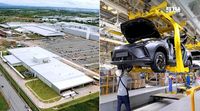In a significant move for the Thai automotive industry, three prominent Chinese car manufacturers—MG, BYD, and Great Wall Motor—are ramping up production capabilities in Thailand to cater to the growing demand for hybrid and electric vehicles in ASEAN markets. This strategic expansion comes as the global automotive landscape shifts towards sustainability, with these companies investing heavily in local production facilities.
The SAIC Motor-CP factory, which produces MG vehicles in Chonburi, boasts a production capacity of 100,000 units per year. Meanwhile, Great Wall Motor's facility in Rayong can produce up to 80,000 units annually. BYD, on the other hand, has ambitious plans to reach a production capacity of 150,000 units per year, although current production levels have yet to meet these targets.
BYD is set to make its mark this year by exporting the BYD SEALION 6 DM-i, a new plug-in hybrid model. This follows the company's strategy to manufacture various electric vehicle models, including the BYD DOLPHIN and BYD ATTO 3, at its Thailand facility, which can accommodate both left- and right-hand drive vehicles.
Mr. Suroj Sangsanit, Assistant Director of Corporate Affairs at SAIC Motor-CP, emphasized the company’s commitment to the Thai labor market, noting, "MG has confidence in the development of the Eastern Economic Corridor, due to government policies that support investment in the country, and there are many jobs available, with over 1,000 employees, 98% of whom are Thai." This commitment is indicative of a broader trend among foreign manufacturers to localize production and contribute to the domestic economy.
Great Wall Motor is also expanding its production capabilities in Rayong, with plans to increase output to meet both local and international demand. The company has already begun exporting models such as the TANK 500 HEV to Malaysia and TANK 300 HEV to Indonesia. Additionally, the HAVAL H6 HEV and JOLION HEV are being sent to Vietnam, while the ORA Good Cat is set for markets in Brazil, Australia, and New Zealand.
Mr. James Yang, GWM's Head of International Markets, stated, "We are committed to increasing investment in the Thai economy through the production and export of various car models, covering all power types, for local users, particularly in the ASEAN region, as well as Australia and Latin America." This commitment not only reflects GWM's dedication to expanding its market share but also highlights the importance of Thai manufacturing in the global automotive supply chain.
With the automotive industry in Thailand poised for growth, government support plays a crucial role. The recent "Pickup Buddy" initiative aims to stimulate the market by providing financial backing for consumers, which is expected to alleviate some of the financial constraints that have been weighing on the automotive sector.
As these manufacturers enhance their production capabilities, they are also focusing on sustainability. For instance, BYD's commitment to producing electric and hybrid vehicles aligns with global trends towards reducing carbon emissions and promoting environmentally friendly transportation options.
The investments made by these companies are not just about increasing vehicle output; they also represent a significant shift in the region's automotive landscape. The establishment of production facilities in Thailand allows these brands to tap into the growing ASEAN market while simultaneously contributing to local economies through job creation and technology transfer.
In addition to the economic benefits, the expansion of electric and hybrid vehicle production in Thailand is expected to foster innovation in the automotive sector. As companies like MG, BYD, and Great Wall Motor invest in new technologies and manufacturing processes, they are likely to enhance the overall competitiveness of the Thai automotive industry on a global scale.
However, challenges remain. The Thai automotive market is still recovering from the impacts of the pandemic, and financial constraints continue to affect consumer purchasing power. The automotive sector's performance in 2025 is projected to be similar to the previous year, with total sales estimated at around 570,000 units. The pickup truck segment, which has been particularly hard hit by stringent financing conditions, is expected to see only a modest recovery.
Despite these challenges, the outlook for the Thai automotive industry remains optimistic. With the increasing demand for electric and hybrid vehicles, manufacturers are well-positioned to capitalize on this trend. The strategic investments being made by Chinese automakers in Thailand not only underscore the country's importance as a manufacturing hub but also reflect a broader commitment to sustainability and innovation in the automotive sector.
As the industry evolves, it will be crucial for these manufacturers to continue adapting to changing market conditions and consumer preferences. The success of their initiatives will depend on their ability to navigate the complexities of the automotive landscape while remaining focused on delivering high-quality, sustainable products that meet the needs of consumers both in Thailand and abroad.






